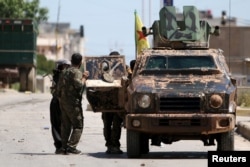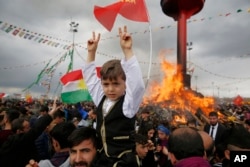Russian and Turkish soldiers are facing off over the Syrian Kurdish canton of Afrin. Ankara says the area that borders its territory is under the control of PYD ‘terrorists’ affiliated with the Kurdish insurgent group the PKK. But Moscow, like Washington, views the PYD and its YPG militia which controls Afrin as key to fighting Islamic State.
Moscow took Ankara by surprise when it deployed forces in the canton to monitor a cease-fire between YPG and the Free Syrian Army, which is backed by Turkey. On Wednesday violence erupted again. Ankara said one of its soldiers was killed by a sniper shooting across the border, prompting Turkish artillery to retaliate.
The YPG-controlled region has been under threat since Turkey launched a military incursion into Syria in August. Operation Euphrates shield has twin objectives, of removing Islamic State and the YPG militia and its political wing PYD. But Russian deployment puts Euphrates Shield in question.
“Practically it means the end of Operation Euphrates Shield,” said former senior Turkish diplomat Aydin Selcen, who served across the region. "The military operation cannot move down south towards Raqqa, because there is the Syrian Arab Army or Assad together with the Russians. It cannot turn east towards Manbij as it’s suggested by the Turkish government. Why? Because there is [the] Syrian Army backed by … Russia and also you have the U.S. special forces there along [with] U.S. Army Rangers. Militarily it means the end of the operation."
Sensitive issue
Ankara has made little secret of its displeasure.
“This is one of the biggest sensitivities we as a government have. Unfortunately, both Russia and the U.S. have not been sensitive to this as part of both the Raqqa and Manbij operations,” said Turkish Deputy Prime Minister and government spokesman Numan Kurtulmus.
Russia’s deployment in Syria could add to pressure and criticism of Ankara's Syrian policy.
“Syria has brought us to the point whatever we are going to do we are going to antagonize Moscow, the United States and Iran. We can't stand up to all of them,” warns political consultant Atilla Yesilada of Global Source Partners.
But powerful domestic considerations continue to drive foreign policy. Turkish President Recep Tayyip Erdogan is campaigning on a nationalist platform before next month’s referendum to extend his presidential powers. Standing up to the Kurdish insurgent groups, the PKK and what he calls its affiliates in Syria, is an important part of that campaign message.
Symbol for Kurds
Turkish security forces for months have been fighting across Turkey’s predominantly Kurdish southeast, while also targeting the legal Kurdish movement. The successes of Syrian Kurdish forces have become a powerful symbol for Kurds in Turkey.
“Even though they [Turkish security forces] have arrested thousands, our towns and cities have been destroyed here, people are being encouraged by the gains of the Rojava [Kurdish name of the region under Syrian Kurdish control] resistance, by the progress of the PYD and YPG in Syria,” said Ertugral Kurkcu, a parliamentary deputy of Turkey’s pro-Kurdish HDP Party.
Tuesday, tens of thousands of Kurds gathered in Diyarbakir, the main city in Turkey’s predominantly Kurdish southeast, to celebrate the Kurdish New Year. The mass gathering turned into a political event with pictures and slogans in support of jailed PKK leader Abdullah Ocalan and speakers calling for a "no" vote in next month’s referendum.
Kurdish entity seen as inevitable
Syrian Kurdish forces, buoyed by growing military support by Moscow and Washington, are continuing to make territorial gains as they move on Raqqa, Islamic State’s self-declared capital.
“If Turkey is unhappy with Syrian Kurds expanding their territory and their control, there is only one way to stop it, it is to cooperate with Damascus,” suggests Haldun Solmazturk, head of the Ankara-based Twenty First Century Turkey Institute. He said, “By not coordinating and harmonizing is military operation with Damascus, Turkey is helping with the dismembering of Syria and the Kurds are benefiting from this.”
Ankara has started to temper its vociferous opposition to Syrian president Bashar al-Assad, with ministers suggesting Turkey could be ready to drop its demand for Assad to immediately step down, while others express the need for talks with Damascus.
But any dramatic reversal in policy by Ankara is considered unlikely and is probably too late.
“Russian reconciliation efforts between Kurds and Damascus is continuing and it definitely envisages decentralization of the Syrian state as part of it,” said former Turkish diplomat Selcen.
Observers warn with few options remaining, Ankara must sooner or later come to terms with a Syrian Kurdish entity on its border.






